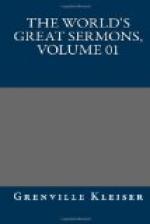The apostle here uses a Syrian and Greek word, saying, Abba, Pater. This word Abba, in the Syrian tongue, signifies a father, by which name the heads of monasteries are still called; and by the same name, hermits in times past, being holy men, called their presidents: at last, by use, it was also made a Latin word. Therefore that which Paul saith is as much as Father, Father; or if thou hadst rather, “my Father.”
Verse 7. “Wherefore thou art no more a servant, but a son, and if a son, then an heir of God through Christ.” He saith, that after the coming of the Spirit, after the knowledge of Christ, “thou art not a servant.” A son is free and willing, a servant is compelled and unwilling; a son liveth and resteth in faith, a servant in works. Therefore it appears that we can not obtain salvation of God by works, but before thou workest that which is acceptable to Him, it is necessary that thou receive salvation; then good works will freely flow, to the honor of thy heavenly Father, and to the profit of thy neighbors; without any fear of punishment, or looking for reward.
If this inheritance of the Father be thine by faith, surely thou art rich in all things, before thou hast wrought any thing. It is said “Your salvation is prepared and reserved in heaven, to be showed in the last time,” wherefore the works of a Christian ought to have no regard to merit, which is the manner of servants, but only for the use and benefit of our neighbors, whereby we may truly live to the glory of God. Lest that any think that so great an inheritance cometh to us without cost (altho it be given to us without our cost or merit), yet it cost Christ a dear price, who, that He might purchase it for us, was made under the law, and satisfied it for us, both by life and also by death.
Those benefits which from love we bestow upon our neighbor, come to him freely, without any charges or labor of his, notwithstanding they cost us something, even as Christ hath bestowed those things which are His upon us. Thus hath Paul called back the Galatians from the teachers of works, which preached nothing but the law, perverting the Gospel of Christ. Which things are very necessary to be marked of us also: for the Pope, with his prelates and monks hath for a long time intruded, urging his laws, which are foolish and pernicious, disagreeing in every respect with the Word of God, seducing almost the whole world from the gospel of Christ, and plainly extinguishing the faith of sons, as the Scripture hath in diverse places manifestly prophesied of His kingdom. Wherefore let every one that desires salvation, diligently take heed of him and his followers, no otherwise than Satan himself.
LATIMER
ON CHRISTIAN LOVE
BIOGRAPHICAL NOTE
Hugh Latimer, reformer and martyr, was born in Leicestershire, England, in 1485, or two years later than Luther. On completing an education at Cambridge, he took holy orders and preached strenuously in favor of the Lutheran views. As a profound canonist, he was placed on the commission appointed to decide on the legality of Henry VII’s marriage with Katharine of Aragon. His decision in favor of Henry gained him a royal chaplaincy and a living.




